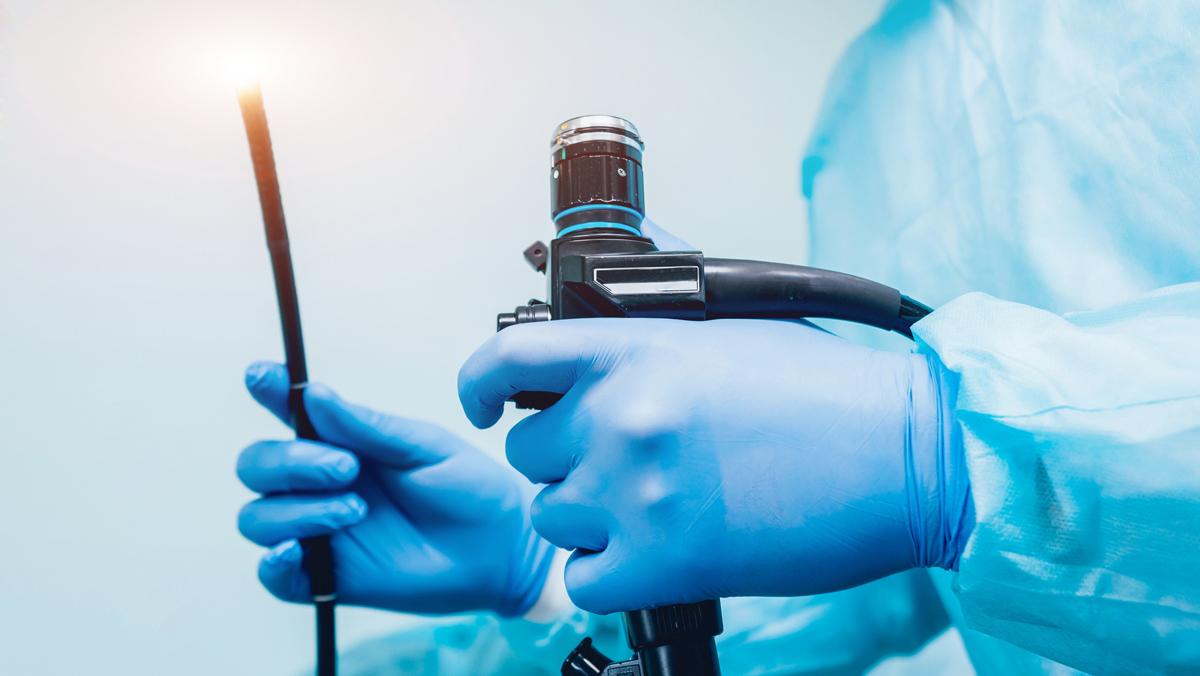Obesity and the endoscopy space: Innovative, minimally invasive weight loss

According to the World Health Organization (WHO), in 2022, 2.5 billion adults aged 18 years and older were overweight, including over 890 million adults who were living with obesity. This equates to 43% of adults aged 18 years and over (43% of men and 44% of women) who were overweight. In 1990, just 25% of adults aged 18 years and over were overweight.
Tackling this global obesity crisis takes many guises, the most newsworthy of which has focused on FDA-approved GLP-1 receptor agonists. However, endoscopic sleeve gastroplasty (ESG), although perhaps not widely spoken about, offers another treatment option that is complimentary to bariatric surgery and pharmacotherapy. A minimally invasive procedure for weight loss, indeed, it might even be a better option for some patients.
Certainly, the pharmaceutical approach is not for everyone – whether it be due to cost implications, drug intolerance, or issues with long-term adherence. ESG is an option for helping people lose weight via a minimally invasive approach, without precluding any future procedure or therapy the patient might need.
To learn more about the work of Boston Scientific in the endoscopy and wider GI space, and to discuss weight loss and GLP-1s more broadly, pharmaphorum spoke with Astrid Monteau, VP of Endoscopy in EMEA at Boston Scientific.
A disease, not a condition
A biotechnology engineer by background, Monteau’s Master’s degree was in healthcare management, and she started the early days of her career at Janssen-Cilag, part of Johnson & Johnson. Having worked mainly in oncology, Monteau was later presented with the opportunity to move to MedTech at a Europe-wide level and, at the time of speaking with pharmaphorum, she had just celebrated her 18th year working at Boston Scientific.
Now heading the Endoscopy business – one of seven business units at the company – for the Europe, Middle East & Africa (EMEA) region, Monteau explained that the overall positioning of Boston Scientific is about being “minimally invasive.”
“Endoscopy is definitely highlighting very well, I would say, this term of ‘minimally invasive’,” she said. “After all, it creates less trauma on the body, patients may be able to recover faster and, by extension, it may result in decreased health system burden.”
When it comes to the obesity and overweight field itself, though, Monteau is very firm about correcting the misconception that they are merely ‘conditions’.
“It's not a condition: it's a disease, a chronic disease,” she states. “It's multifactorial; it's a long-term disease. A condition is something that people think just changing the lifestyle is going to correct. You often have [people] saying, ‘Okay, you need to eat less, do more exercise, and it's going to go away’. Actually, now there is general consensus recognising that obesity is a chronic, relapsing, progressive disease.”
What compounds the issues that this presents are the comorbidities that obesity and being overweight cause: cardiovascular conditions, type 2 diabetes, stroke, and certain cancers, as well as the impact it has on mental health and emotional well-being.
“Obesity is currently defined by what we call BMI, body mass index,” said Monteau. “If it's above 30, it's considered obesity; if it's between 25 and 30, it's considered overweight. Across Europe, you have a range of 40% to 65% of adults living with obesity and [being] overweight. This is a huge number.”
Factors contributing to the ramifications of this disease as it stands include the socio-economic: overweight and obesity numbers tend to be higher in areas of economic difficulty, where there are often ‘food deserts’, but also correlate with those areas deprived of adequate access to weight management services.
In February 2024, NICE issued positive guidance for ESG. This is the first time the treatment became available on the National Health Service (NHS), which recorded over one million hospital admissions linked to obesity in England in 2022/23 – an increase of 8% on the previous year. Currently, ESG is available in 20 NHS hospitals, including London, Berkshire, the Midlands, County Durham, Bristol, Staffordshire, North Tees, and Bedfordshire.
“You have 20 NHS centres with weight management services offering ESG in the UK, and they are all in the south and all around London,” explained Monteau. “[But] more than half of the population who are living with obesity are in the north. There is a complete discrepancy between the service that is provided to support these patients and […] where the patients are located. This is also something that we need to take into consideration.”
GLP-1s and the pros and cons of a pharmaceutical approach
According to Blue Health Intelligence, the introduction of GLP-1 agonist (GLP-1) drugs “significantly disrupted traditional approaches to weight and obesity management.” Indeed, ever since FDA approval of semaglutide (Wegovy) for weight management in June 2021, “net sales of all such anti-obesity medications have increased, amounting to an estimated $1.1 billion in the second quarter of 2023.”
But, for Monteau, what GLP-1s offer is the ability to raise awareness about the existence and availability of the treatment pathway for those living with obesity.
“It's going to play a crucial role in bringing more people living with obesity into the treatment pathway,” she said. “[Of the] 1.9 billion [affected], only 1% to 2% of patients go into the treatment pathway […] GLP-1s help with the idea of medicalising obesity […] But it is really a multidisciplinary approach that is going to make the difference.”
Indeed, as with anything, not every type of option is going to suit everyone. And with GLP-1s, not only can there be side effects, but, if a patient stops the treatment, they can regain the weight.
“[This] basically drives the idea that it's a lifetime treatment [and] has consequences," cautioned Monteau. "[Not just with] the potential side effects, but also from a cost-effectiveness perspective. It cannot be the solution for every single patient."1
Bariatrics and other surgical alternatives
Nearly 200,000 bariatric surgeries were performed in the US alone in 2020, based on data from the American Society for Metabolic and Bariatric Surgery, which addresses ~1-2% of the adult bariatric eligible population. And, in 2023, recognising the need for less invasive procedures for patients, Boston Scientific entered this emerging but fast-growing field of endobariatrics by acquiring the OverStitch Endoscopic Suturing System platform.
The MERIT trial showed that, one year after an ESG procedure, patients have been shown to lose an average of 13% of their total body weight, which represents 49% of their excess body weight. Two years post-procedure, it has been found that 68% of patients who follow the programme maintain most of that weight loss.
The ESG procedure helps with weight loss by reducing the size of the stomach and increasing the time it takes for food to pass through. But patients also need to follow a healthy diet and exercise programme to lose weight. Their doctor’s clinical team, including dieticians, nutritionists, and/or exercise trainers, should help the patient with their weight loss journey. Indeed, self-empowerment of patients is crucial.
“There is nothing magic in any option, and it is extremely important that when we create awareness [for] the patient [about their] options – pharmaceutical, surgical, or endoscopic – there is a need to really surround the patient with the right support,” Monteau said. “It has to be accompanied by a nutritionist, a dietician, a training exercise coach, a psychological follow-up […] It's a journey [and] if you do not combine the multidisciplinary approach together with the procedure, it's going to be a failure at midterm.”
There is, however, the burden that the very word ‘surgery’ carries that steers some patients from pursuing such a route, no matter how ‘minimally invasive’.
“Bariatric surgery has been demonstrated to be very effective for people living with obesity, but it has been demonstrated as well that patients are scared by the surgical act and the potential risks associated,” explained Monteau. "ESG is what we call a 'minimally invasive' procedure: placing an endoscope through the mouth to perform the procedure; there is no scar and patients can typically be discharged the same day."
“Getting an ESG does not rule out surgery at a later date, [and] the procedure only lasts 90 minutes,” continued Monteau.
Indeed, NICE guidance states that it can be done as a day case procedure, but most patients require an overnight stay.
A ‘minimally invasive’ future horizon
Boston Scientific, through intensive professional education in the ESG procedure with OverStitch, hopes to expand the 20 weight management services in the UK. The company has opened a £1 million Institute for Advancing Science in the UK, a dedicated facility in which to train physicians.
“We are first working hand-in-hand with the NHS and authorities [to select] centres and be sure that we address the right department, the right physician,” explained Monteau. “Because of this key acceleration that the NHS triggered with ESG, we are committed to training a large number of healthcare professionals, and not only physicians, [but] also nurses and other members of the multidisciplinary team.”
“Once the patient is in the treatment pathway, they need to end up in a place where the journey is going to maximise the chance for them to have a strong outcome, a long-lasting outcome, with the patient also self-empowered,” she continued. "ESG is minimally invasive. It's clinically proven, and it's also lasting [and] a very strong and valid option for people living with obesity, to help them [along] this journey."
References
Muhammad Haseeb,MD, MSc; Jagpreet Chhatwal, PhD; Jade Xiao, MSc; Pichamol Jirapinyo,MD, MPH; Christopher C. Thompson, MD, MSc, “Semaglutide vs Endoscopic Sleeve Gastroplasty for Weight Loss”, Gastroenterology and Hepatology, JAMA Network Open. 2024;7(4):e246221. doi:10.1001/jamanetworkopen.2024.6221
ENDO-2048002-AA
About the interviewee
 Astrid Monteau-Martin is VP of the Endoscopy division at Boston Scientific in EMEA (Europe, Middle East & Africa). With over 20 years of medtech experience, Monteau-Martin has held several sales and marketing leadership roles within pharmaceutical companies first, and then within Boston Scientific, in neuromodulation, endoscopy, and cardiac rhythm management business units. She earned a first-class degree in Biotechnology Engineering from the Institut Superieur de Technologie and her Master's in Marketing Management from the European Management School.
Astrid Monteau-Martin is VP of the Endoscopy division at Boston Scientific in EMEA (Europe, Middle East & Africa). With over 20 years of medtech experience, Monteau-Martin has held several sales and marketing leadership roles within pharmaceutical companies first, and then within Boston Scientific, in neuromodulation, endoscopy, and cardiac rhythm management business units. She earned a first-class degree in Biotechnology Engineering from the Institut Superieur de Technologie and her Master's in Marketing Management from the European Management School.
About Boston Scientific

Boston Scientific transforms lives through innovative medical technologies that improve the health of patients around the world. As a global medical technology leader for more than 45 years, we advance science for life by providing a broad range of high-performance solutions that address unmet patient needs and reduce the cost of health care. Our portfolio of devices and therapies helps physicians diagnose and treat complex cardiovascular, respiratory, digestive, oncological, neurological and urological diseases and conditions. Learn more at www.bostonscientific.com and connect on LinkedIn and X, formerly Twitter.










